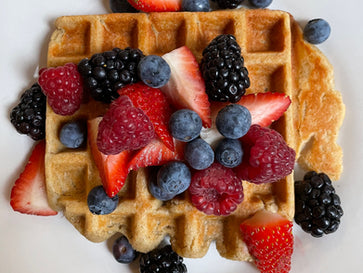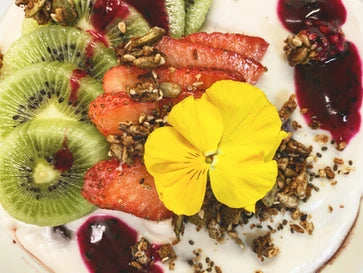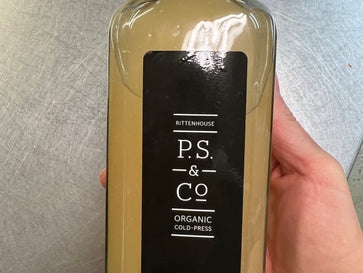Gluten has become such a household name, it’s hard not to come across “gluten-free” options on most restaurant menus. But what is gluten, and why would people try to avoid it? Gluten is a name for proteins that are found within wheat. This includes farro, wheat berries, durum, semolina, spelt, farina, rye, einkorn, and barley. Gluten can help food keep its shape, i.e. cakes, cookies, crackers, pizzas, pastas, pancakes, and breads. The Latin translation of gluten is actually “glue” which is fitting because it is technically the glue that holds everything together in baking.
Some people may have gluten sensitivities, and this can make it a bit more challenging to eat out, cook at home, or avoid in our everyday lives. Gluten can cause headaches, inflammation, bloating, and irritable gastrointestinal issues among some. Other individuals can have very serious reactions - especially for those who have celiac disease. Celiac disease is a chronic immune and digestive disorder that harms the small intestine. This disease is triggered by gluten and causes an imbalance of gut bacteria. This disease may cause rashes on the skin and havoc with diarrhea and nausea. Especially a problem in North America and Europe, an estimated 5% of people suffer from Celiac disease. Being a disease that stems from various factors, it also coincides with nutritional deficiencies, thyroid, reproductive, and kidney issues. Individuals who develop celiac disease carry specific risk genes, but the genes alone are not enough to develop the disease. It’s been said that environmental factors come into play as well. One factor is the intestinal microbiota. Microbiota is a group of microorganisms within the body in the intestine, skin, oral cavity, nasal passages, and urogenital tract. The G.I. microbiota can help to determine the health of an individual, especially someone who may be on restrictive diets via disease. But could this actually all be stemming from an agricultural factor? A recent study showed that glyphosate, the active ingredient in the herbicide Roundup®, is the main cause of gluten intolerance and celiac disease. Our wheat crops are being sprayed at an astronomical rate which is on the rise, along with the celiac disease. Patented as an antimicrobial (Monsanto Technology LLC, 2010), Glyphosate has been shown to disrupt gut bacteria among animals. Now, we are seeing the effects of Roundup® on the human gut as well. Glyphosate has been known to not only be the triggering factor of Celiac disease, but is also connected to obesity, autism, infertility, Alzheimer’s disease, Parkinson’s disease, and depression.
Are you surprised to read that none of our chefs or owner at P.S. & Co. need to eat gluten-free? They created a menu as such to hopefully make a menu that is more inclusive and a restaurant that is a safe space for those who have trouble eating out. We've been learning and witnessing how some severe cases of Celiac sufferers are also avoiding pseudo-grains such as quinoa, buckwheat, amaranth, chia, and even almond flour. They can't explain why these healthful ingredients are causing similar symptoms to gluten. Avoiding one ingredient, and then overconsuming the same other ingredients may not be the solution. Variety may be an important key to keeping the gut happy. We're not planning to stop using these other healthy grains in our menu but have learned to ask more questions if a guest shares, they have Celiac. There's also been chatter about some compostable/sustainable packaging causing irritation for those with Celiac. That's a deep dive into another blog post, but we hope if you have such high-level sensitivities, please bring your own container for take-out or even better, dine in person with us.
Surprising Places Gluten May Be Hiding
-
Soy sauce - Unless specified otherwise, soy sauce contains wheat. Try to look for gluten-free options such as San-J Tamari which is what we use at our shop.
-
Beer - May contain barley. There are more and more gluten-free options now, including hard ciders.
-
Malt - including malted barley flour, malted milk, and milkshakes, malt flavoring, malt vinegar, malt extract, malt syrup all of which commonly contain barley. We like to use the superfood, maca powder, as a close flavor alternative to malt.
-
Supplements and medications
-
Gravy - flour tends to be the staple thickener.
-
Soup - may also use flour as a thickener.
-
Salad Dressings - may contain soy sauce, malt vinegar, or flour
-
Candy
-
Communion wafers
-
Play-dough - can be made gluten-free with simple at-home recipes that consist of tapioca starch, rice flour, and salt.
Gluten-Free Options
-
Rice and Rice Noodles - Our shop uses Jovial Brown Rice Pastas.
-
Oatmeal - oats can be certified organic and gluten-free. We are unable to source both organic and gluten-free oat flour, so we buy certified organic and certified gluten-free whole oats. Then, grind them into oat flour to ensure our organic and gluten-free standards are both upheld.
-
Quinoa - a nutrient-packed ancient whole grain that has grown in popularity the past decade. Can be added to various salads, soups, stuffed into a pepper, or anywhere as a rice replacement.
-
Amaranth - another powerful ancient grain, amaranth is full of manganese, fiber, iron, and antioxidants. Try our Organic Protein-Packed Amaranth Porridge with fresh fruit, maple pecans, and coconut yogurt drizzle.
-
Nut flours for baking - P.S.& Co. is famous for using organic, small batch nut flours such as almond flour found in many of our baked goods
-
Other Gluten-Free Flours - many gluten-free flours are full of starches, gums and heavier flours that may also be difficult to digest or absorb. Please experiment what ingredients work and may not work for you.
Just a Few Sweet and Savory Options from P.S.& Co. - As Always, Gluten-free
-
Organic Plain Oat Flax Bagel
-
Organic Sesame Seed Roll
-
Organic Mohinga Noodle Sou
-
Organic Ceasar Salad
-
Organic Savory Scones
-
Organic Cakes and Cupcakes
-
Organic Tahini Chocolate Chip Cookie
-
Organic Banana Bread



https://www.ncbi.nlm.nih.gov/pmc/articles/PMC7442381/
https://www.ncbi.nlm.nih.gov/pmc/articles/PMC6213115/
https://celiac.org/gluten-free-living/what-is-gluten/
https://www.niddk.nih.gov/health-information/digestive-diseases/celiac-disease/definition-facts
https://www.ncbi.nlm.nih.gov/pmc/articles/PMC3945755/pdf/ITX-6-159.pdf





Leave a comment
This site is protected by hCaptcha and the hCaptcha Privacy Policy and Terms of Service apply.